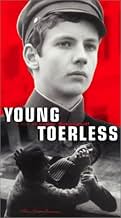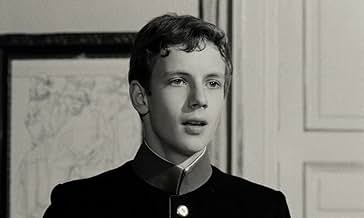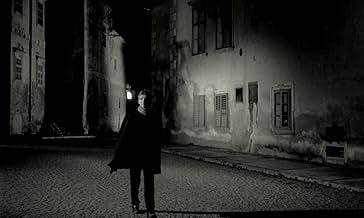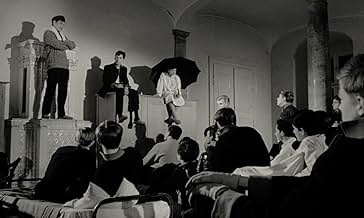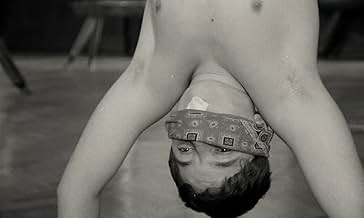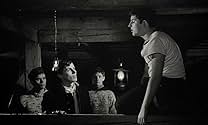IMDb RATING
7.2/10
2.8K
YOUR RATING
In a boarding school, a student observes in passive disgust as his two friends manipulate, humiliate and torture a fellow student, justifying their every act.In a boarding school, a student observes in passive disgust as his two friends manipulate, humiliate and torture a fellow student, justifying their every act.In a boarding school, a student observes in passive disgust as his two friends manipulate, humiliate and torture a fellow student, justifying their every act.
- Director
- Writers
- Stars
- Awards
- 4 wins & 1 nomination total
- Director
- Writers
- All cast & crew
- Production, box office & more at IMDbPro
Featured reviews
1. It's been said here that the gay content of the story has been removed. Well, the novel was released in 1905. We can nowadays interpret elements of the story in a gay context, but back then these notions did not exist. If Schlöndorff hints at homosexuality as an element of perversion, that is in fact faithful to the novel, which takes a strictly observatory, non-participating stance.
2. 'Törless' is often interpreted as an indicator of upcoming intolerance and Nazidom. Again, the novel was released at a much too early time to allow for such an interpretation; the novel's author Robert Musil certainly envisioned the inevitable fall of an empire stuck to tradition and incapable of accommodating personal liberties. Schlöndorff pushes some of the juvenile delinquents into similarities with the Nazis - albeit being carefully ambiguous about it -, but it would be wrong to consider this interpretation as a part of the original narrative.
3. 'Törless' is a highly psychological tale and film - again, Schlöndorff proves faithful to the novel in this respect. But this comes with the weakness of constructing characters around a certain social concept. It would be misleading to consider Törless and his rebellious friends as typical representatives of their era, or real figures upon which the author based his characters. As may be more obvious in Musil's masterpiece, 'The Man without Qualities', his characters are crafted to evoke rather a situation than a person; that makes his books almost impossible to adapt correctly.
Schlöndorff's film is somewhat middlebrow; it does not intend to be a substitute for reading the novel, but at the same time it carefully avoids to give the impression that it is anything but a rendition of it. That's not quite true; the interpretation is in the framing, the omissions of the subtext, and that the ideas upon watching the film differ considerably from those you get when you read the novel. One may call it therefore a failure - but an interesting failure to watch.
2. 'Törless' is often interpreted as an indicator of upcoming intolerance and Nazidom. Again, the novel was released at a much too early time to allow for such an interpretation; the novel's author Robert Musil certainly envisioned the inevitable fall of an empire stuck to tradition and incapable of accommodating personal liberties. Schlöndorff pushes some of the juvenile delinquents into similarities with the Nazis - albeit being carefully ambiguous about it -, but it would be wrong to consider this interpretation as a part of the original narrative.
3. 'Törless' is a highly psychological tale and film - again, Schlöndorff proves faithful to the novel in this respect. But this comes with the weakness of constructing characters around a certain social concept. It would be misleading to consider Törless and his rebellious friends as typical representatives of their era, or real figures upon which the author based his characters. As may be more obvious in Musil's masterpiece, 'The Man without Qualities', his characters are crafted to evoke rather a situation than a person; that makes his books almost impossible to adapt correctly.
Schlöndorff's film is somewhat middlebrow; it does not intend to be a substitute for reading the novel, but at the same time it carefully avoids to give the impression that it is anything but a rendition of it. That's not quite true; the interpretation is in the framing, the omissions of the subtext, and that the ideas upon watching the film differ considerably from those you get when you read the novel. One may call it therefore a failure - but an interesting failure to watch.
What's interesting about this film is the way it unapologetically removes the true and original gay content from the story. Torless has a passionate gay affair in the original. In the film gayness is alluded too as perhaps a contributing factor to the corruption of innocents via the pursuit & discovery of knowledge & experience. As a gay person with a broad understanding of the systematic exclusion and removal of gay people from history, the main theme of the film, re: the brutality , sadism and masochism & manifestation of fascism is somehow deeply compromised by the idea that it is excusable, if not absolutely impossible to reveal Torless's gay self as a positive and actual fact of his boyhood because it would offend European bourgeoisie taste of the 60s. So the sensationalism of fascism is portrayed and the recent anti-Semitic WW11 history of Austria 'allowed' as an allusion to it's part in Nazi history, but homosexuality is still being demonised and censored in a film which purports to be about anti-fascism. I don't buy that - and we've all been robbed of the true story - where Torless , far from being a dried up , cold 'acceptably' moral and suggestively straight prude, in the real story embraces the presence of gay feelings rampant in the original story and which contribute to the whole process of his crisis about morality which the film hijacks to portray a censored and acceptable message of it's own.
Young Törless is a pertinent reflection on good and evil and the way an individual behaves, given the lack of values in others.
In comparison with the moral and ethical values required by institutions, human behavior seems to follow an errant, amoral path, simply determined by chance, or the current of events. Especially when manifested in a group, human beings lose any values and act according to the tide. They practice excesses and suffer humiliations instinctively, as if they were a fatality of life.
The few who show the courage to remain faithful to fundamental values are marginalized, seen as outsiders, labeled as dreamers.
Being a German film from 1966, it is impossible not to relate this criticism to the rise and fall of Nazism, just 21 years earlier.
A film in which Volker Schlöndorff puts a finger on the wound of Nazism, still open in German society, and forces his compatriots to reflect on the mistakes of the past.
In comparison with the moral and ethical values required by institutions, human behavior seems to follow an errant, amoral path, simply determined by chance, or the current of events. Especially when manifested in a group, human beings lose any values and act according to the tide. They practice excesses and suffer humiliations instinctively, as if they were a fatality of life.
The few who show the courage to remain faithful to fundamental values are marginalized, seen as outsiders, labeled as dreamers.
Being a German film from 1966, it is impossible not to relate this criticism to the rise and fall of Nazism, just 21 years earlier.
A film in which Volker Schlöndorff puts a finger on the wound of Nazism, still open in German society, and forces his compatriots to reflect on the mistakes of the past.
By today's standards, a film like "Young Torless" may seem too coy and archly philosophical (and thus pretentious) a take on the corruption of youth, and the sources from which the corruption stems. Its strength, however, lies in the telling: when a student at a preparatory academy robs a peer to pay off a debt, he finds himself enslaved, both psychologically and sexually, by a gang of rogues looking to push him to the breaking point. In the midst of this is Torless (Matthieu Carriere), a student coming to terms with his identity in the midst of this moral dilemma, and whose mental landscape renders him a frustrated, conflicted character who runs the gamut from cold detachment to vague sympathy. While certain aspects of the film (the homosexual subplot, for instance) seem deliberately repressed due to the era, the implication is enough to give the events an additional potency. The black-and-white cinematography is excellent, capturing a specific atmosphere of dread and meditative solitude--German director Volker Schlondorff is not looking to titillate with sensationalist content, but instead spin a story of a young adult's struggle with the evils of an imperfect world. And on that level, "Young Torless" is one of the best films of its kind.
Young Toerless is some kind of whizz kid,ahead of his time.Played by the phenomenal Matthieu Carrière -who was only 16 at the time;I 'm looking for another actor ,able to play such an intellectual part,at such an early age!-He worries about imaginary(complex) numbers.For him,a square is positive,so the existence of such numbers (the square root of -1 can be i or -i)eludes him.He admits they are useful in geometry(rotations,similitaries)or trigonometry or even to build bridges,but he 's got to admit it without understanding the mathematical concept(You'll find out when you know ten times more in maths,the teacher says)During the movie,he will discover that a lot of things in life have to be admitted without a proof.
The film takes place in an old secondary school,in Austria,at the beginning of the 20th century,while Francis Joseph-whose photographs are pinned everywhere- was still the regnant emperor .This is the end of an era ,1914 is not far away. An iron discipline,students in uniform,the necessary and sufficient condition for the emergence of oppressors and their punching bag.
Two students choose one of their mates as a victim (to make up for their frustrated sexuality,because of a latent homosexuality?Ascene in which they're looking at erotic photographs is telling)And not the first to come!Someone different.Only difference can lead to inferiority. The poor lad stole some stuff,and now his mates can threaten him to reveal the whole thing to the teachers if...
So begin more and more sadistic scenes,culminating with the one at the gymnasium(A symbol : a punch bag is generally a sport outcast) where almost everyone inflicts moral and physical tortures on him.The former is the most humiliating:one of the cowards reads a letter from the unfortunate boy's mother,a widow sometimes unable to make ends meet-all the others are very rich kids-,making a fool of her.
And Toerless?He's primarily a spectator.Not exactly a peeping tom,but someone who uses the whole school,and its particularities,as an experiment behind closed doors.Evil exists as imaginary numbers do,we have to cope with it,even if we cannot understand its source.He will not intervene to help his neighbor,worse,he will shun the sound and the fury,which may infuriate many people who watch this movie.Actually,for Toerless, and for the teachers-who do not seem to be that much angry when they discover the horrible things that happen behind their walls,they are worthy forerunners of Nazis who thought the feeble ,the sick and the "different" one had to be eliminated-,the punch bag story is almost an abstract fact,which they intellectualize to a fault.
Matthieu Carrière has never made the career he deserved."Die jungeToerless" is not exactly an entertaining movie,but if you are looking for something different,this might be your cup of tea.
The film takes place in an old secondary school,in Austria,at the beginning of the 20th century,while Francis Joseph-whose photographs are pinned everywhere- was still the regnant emperor .This is the end of an era ,1914 is not far away. An iron discipline,students in uniform,the necessary and sufficient condition for the emergence of oppressors and their punching bag.
Two students choose one of their mates as a victim (to make up for their frustrated sexuality,because of a latent homosexuality?Ascene in which they're looking at erotic photographs is telling)And not the first to come!Someone different.Only difference can lead to inferiority. The poor lad stole some stuff,and now his mates can threaten him to reveal the whole thing to the teachers if...
So begin more and more sadistic scenes,culminating with the one at the gymnasium(A symbol : a punch bag is generally a sport outcast) where almost everyone inflicts moral and physical tortures on him.The former is the most humiliating:one of the cowards reads a letter from the unfortunate boy's mother,a widow sometimes unable to make ends meet-all the others are very rich kids-,making a fool of her.
And Toerless?He's primarily a spectator.Not exactly a peeping tom,but someone who uses the whole school,and its particularities,as an experiment behind closed doors.Evil exists as imaginary numbers do,we have to cope with it,even if we cannot understand its source.He will not intervene to help his neighbor,worse,he will shun the sound and the fury,which may infuriate many people who watch this movie.Actually,for Toerless, and for the teachers-who do not seem to be that much angry when they discover the horrible things that happen behind their walls,they are worthy forerunners of Nazis who thought the feeble ,the sick and the "different" one had to be eliminated-,the punch bag story is almost an abstract fact,which they intellectualize to a fault.
Matthieu Carrière has never made the career he deserved."Die jungeToerless" is not exactly an entertaining movie,but if you are looking for something different,this might be your cup of tea.
Did you know
- TriviaLuchino Visconti had previously tried to set up a version of " Young Torless " with Romy Schneider starring.
- Quotes
Thomas Törless: Yet another day to tell our grandchildren about.
- ConnectionsFeatured in Film Review: International Films (1968)
- How long is Young Törless?Powered by Alexa
Details
- Release date
- Countries of origin
- Language
- Also known as
- Young Torless
- Filming locations
- Eggenberg Palace, Graz, Styria, Austria(military school)
- Production companies
- See more company credits at IMDbPro
- Runtime
- 1h 27m(87 min)
- Color
- Sound mix
- Aspect ratio
- 1.66 : 1
Contribute to this page
Suggest an edit or add missing content

